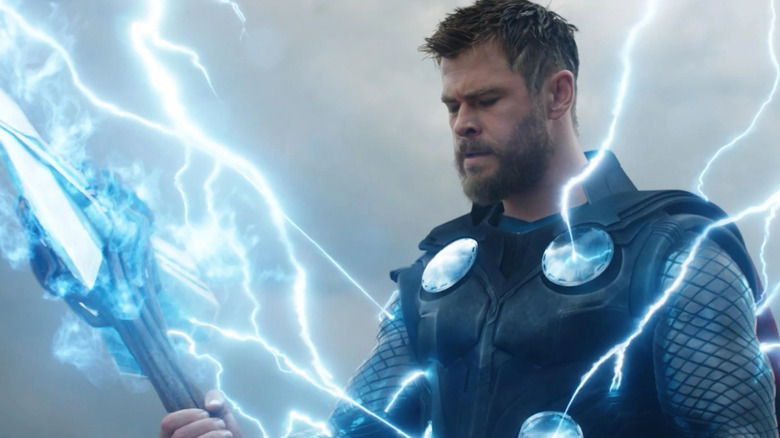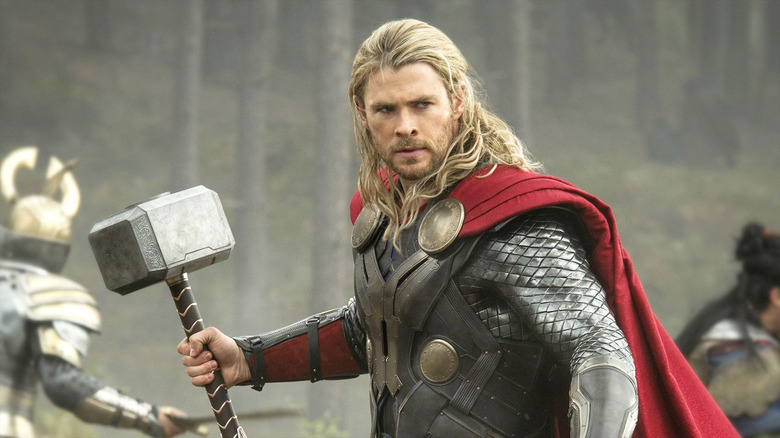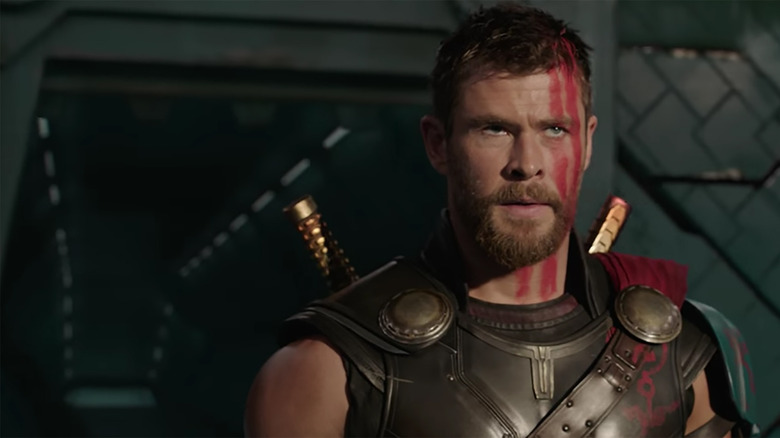Ah, Yes: Thor Will Lose All Of That Endgame Weight In A Training Montage
In 1962, Thor first appeared in Marvel Comics in "Journey into Mystery" #62, reimagining the mythological character as a nebulously powerful interdimensional alien who looked and talked like the Norse god of thunder. He eventually came to be one of the key members of a supergroup called The Avengers, and has since appeared in live-action movies seven times in the past twelve years.
Taika Waititi's "Thor: Love and Thunder" is due in theaters on July 8, 2022, and will be the fourth film devoted to the god of thunder as he was imagined in the Marvel Cinematic Universe. So far, Thor (Chris Hemsworth) has been banished from Valhalla by a vindictive father, lost use of his magical hammer, regained the use of that hammer, lost his mother and father, had his hammer crushed, rebuilt a new hammer, lost an eye, was given a new robotic eye, and lost his godlike physique during a five-year span when he retired from superherodom to drink beer and play video games with a pair of space alien friends. It seems even godlike alien super-beings need to work out to maintain their enormous biceps, death-dealing thighs, and chiseled abs. Several characters made jokes at his expense, comparing his new look to that of The Big Lebowski.
In "Love and Thunder," Thor will lose the weight again a training montage. Given that director Waititi is known for comedy, the audience might safely assume the montage will be comedic.
Thor's physique
Thor's new physique was openly mocked in "Avengers: Endgame," arousing concern in some viewers that his belly was merely a means to employ lazy "fat" jokes. Articles from sites like the Guardian, Cosmopolitan, and The Mary Sue all pointed to the treatment of Thor's body as "problematic." Thor's body had previously been exploited in multiple beefcake shots across the character's film appearances, and both Hemsworth and Thor came to be known for being almost distractingly attractive. The mockery of Thor's "Endgame" body, however, can be seen as par for the course for the characters who insulted him, as the Avengers regularly make jibes at one another's expense. Additionally, Thor was just as capable of murdering monsters on the battlefield with a pot belly as he was with a six-pack. Despite the conversation about Thor's body, "Avengers: Endgame" did not engage in fat shaming the character.
Thor will hit the treadmill in "Thor: Love and Thunder," and it appears that Hemsworth will be seen regaining his old muscular body in a montage. The decision to essentially hit the reset button on Thor's musculature is, however, reductive to the character. In "Endgame," Thor had not merely retired from superhero-ing to rest, but because he — along with the rest of the universe — was responding to great loss. At the point when we meet Thor in "Endgame," half of the universe's population had suddenly vanished in a cosmic cataclysm. In a fit of wrath, Thor brutally executed the perpetrator — he chopped off Thanos's head — but that solved nothing. Thor was still without parents, without his signature weapon, and had failed in his job as a superhero. Thor's pot belly was not a sign of laziness, but a symptom of his trauma.
Eventually, other characters show concern for Thor, and not because of his weight. They are concerned with his mental health. There is a scene in "Endgame" wherein the heroes have gathered a collection of Infinity Stones that will restore the universe's population, but using them will take a great deal of physical strength. Thor, being a god, seems to be the logical choice to use the stones' magic and restore the universe. But, after so much trauma and death in his world, Thor elects not to use them. His friends don't want the magic to hurt him. His teammate, the Incredible Hulk, ends up using his strength to wield the stones and resurrect the dead.
Let him heal
As anyone who has adopted an exercise regiment knows, weight doesn't just fall off, and washboard abdominal muscles don't appear after a mere 50 sit-ups. It's a long process of hard work that takes not just a physical toll, but a mental one. There are too few films about the emotional journey connected to exercise (the 2019 film "Brittany Runs a Marathon" is a rare example). Thor's body is linked with sadness and loss, and his getting back into shape should, perhaps, also address his mental health. Yes, he is a resilient, near-immortal space deity — and, after his appearance in "Thor: Ragnarok," was transformed from a staid warrior into a comedic straight man — but after eight film appearances, it's fair to delve into the character's inner life a little bit.
In order to do proper service to the character, perhaps Thor's weight loss should take time and energy. "Love and Thunder" may address Thor's relationship to his own godlike body, but given the nature of the genre and Waititi's comedy chops, it will likely be a cursory mention thrown in among a swirling, cosmic plot. In "Love and Thunder," the character of Jane Foster (Natalie Portman), a human from Earth, will be given a magical hammer of her own, transforming her into the next Thor.
It remains to be seen whether "Thor: Love and Thunder" will adequately engage with the consequences of Thor's trauma, but perhaps getting back into god-like shape will help him heal and finally get the rest he deserves.


